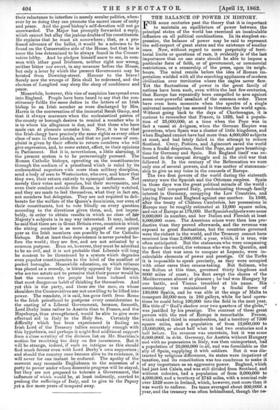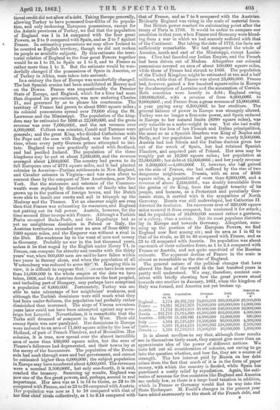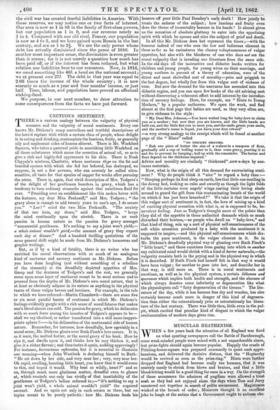THE BALANCE OF POWER IN HISTORY.
FOR some centuries past the theory that it is important to maintain an equilibrium of power between the principal states of the world has exercised an incalculable influence on all political combinations. In its simplest ex- pression, the balance of power may be said to represent the self-respect of great states and the existence of smaller ones. Now, without regard to mere perpetuity of terri- torial limits or questions of race, it evidently is of the last importance that no one state should be able to impose a particular form of faith, or of government, or commercial restrictions, or a censorship of the press, upon its neigh- bours. The mind recoils before the idea of Roman im- perialism wielded with all the searching appliances of modern civilization over territories where the eagles never flew. Yet the fluctuations of power in the great family of nations have been such, even within the last few centuries, that Europe has repeatedly been compelled to arm against some over-powerful assailant of the common order. There have even been moments when the spectre of a single universal monarchy has seemed to threaten the world again. Without going back to the days of Charlemagne, it is curious to remember that France, in 1328, had a popula- tion of 25,000,000, at a time when the Pope was in fact a vassal at Avignon, when the German Empire was powerless, when Spain was a cluster of little kingdoms, and when England cannot have had more than 4,000,000 subjects at most, and had lately failed in the attempt to reduce Scotland. Crecy, Poitiers, and Agincourt saved the world from a feudal despotism, freed the Pope, and gave breathing- time for Germany and Spain. But England itself was ex- hausted in the unequal struggle and in the civil war that followed it. In the century of the Reformation we were only one of several powers, and it was matter of statesman- ship to give us any voice in the counsels of Europe. The two first powers of the world during the sixteenth century were the Spanish and the Ottoman empires. Spain in those days was the great political miracle of the world : having half conquered Italy, predominating through family interest in Germany, occupying the Low Countries, and playing France and England against one another. In 1560, after the treaty of Château Cambresis, her possessions in Europe may be roughly estimated at 12,000 square miles, and out of Europe at 178,000. HerSpanish subjectswere some 9,000,000 in number, and her Italian and ]lemish at least 8,000,000 more. The American mines were then less pro- ductive than they proved afterwards, and the revenue was exposed to great fluctuations, but the countries governed were the richest in the world, and the Treasury cannot have received less than 2,000,0001. a year, which, it is true, was • often anticipated. But the statesmen who were compassing to enslave the world, the veterans who won St. Quentin, and the fleet that was soon to conquer at 'Lepanto, were in- calculable elements of power and prestige. Of the Turks it is impossible to speak precisely, as they were occupied with other cares than census-taking. But Soliman, who was Sultan at this time, governed thirty kingdoms and 8000 miles of coast; his fleet swept the shores of the Mediterranean almost at pleasure ; he had won Hungary by one battle, and Vienna trembled at his name. His ascendancy was maintained by a feudal force of 130,000 Spahis, and he was able at the siege of Malta to transport 30,000 men in 180 galleys, while for land opera- tions he could bring 100,000 into the field in the next year. His title of " God's shadow over two quarters of the globe," was justified by his prestige. The contrast of these great powers with the rest of Europe is remarkable. France, which ranked third in consideration, had a territory of 7500 square miles, and a population of from 12,000,000 to 13,000,000, or about half what it had two centuries and a half before. Its revenue was uncertain, but it was some 6,000,0001. in debt. Germany, for Austria without Hungary and with no possessions in Italy, was then unimportant, had a population of 20,000,000 in all, and was formidable as the ally of Spain, supplying it with soldiers. But it was dis- tracted by religious differences, its states were impatient of taxation, and its constitution was too cumbrous to make it of any importance as an aggressive power. England, which had just lost Calais, and was still divided from Scotland, and without colonies, had a population of from 3,000,000 to 4,000,000, and a territory of 2743 miles, with a nominal rule over 1529 more in Ireland, which, however, cost more than it was worth to enforce. Its taxes averaged about 300,0001. a year, and the treasury was often behindhand, though the no- then that France was exhausting its resources, and England, directed its destinies. Its enormous area of 320,000 square not putting out its full power; Austria, however, for the miles secured it from conquest, but weakened it for attack ; time seemed fitter to cope with France. Although a Turkish and its population of 33,000,000 seemed rather a garrison, Pasha occupied Buda-Pestle, and the Hapsburgs had as or a colony, than a nation. But its most populous districts yet no unrighteous dominion in Poland or Italy, the lay in Europe and towards Germany. Altogether, sum- Austrian territories extended over an area of from 6000 to ming up the position of the European Powers, we find 7000 square miles, and the Emperor was without a rival in England now first among six ; and its area as 1 in 62 to the Diet. His weakness lay in the want of men and money that of its rivals, as 23 to 40 compared with France, and as in Germany. Probably no war in the last thousand years, 23 to 42 compared with Austria. Its population was about unless it be that waged by the English under Henry VI. in one-tenth of their collective force, as 1 to 2.4 compared with France, can compare for atrocity and results with the thirty France or Austria, and not quite one-third of the Russian years' war, when 900,000 men are said to have fallen within estimate. The apparent decline of France in the scale is two years in Saxony alone, and wheu the population of all almost as remarkable as the rise of England. Wurtemburg was reduced to some 80f 'O. Keeping this in The general nature of the political changes that have view, it is difficult to suppose that ' AA) can have been more altered the face of the world in the last hundred years is than 14,000,000 in the whole empire at the date we have pretty well understood. We may, therefore, content our- taken, 1666, and the Austrian dominions as the best peopled, selves with briefly showing how the great powers stood and including part of Hungary, may perhaps have comprised towards one another in January, 1861, when the kingdom of a population of 8,000,000. Fortunately, Turkey was un- Italy was formed, and America not yet broken up. able to take advantage of her neighbours' weakness, and interest on although the Turkish dominions were still much what they Area. Population. Revenue. had been under Soliman, the population had probably rather diminished than increased. The siege of Vienna seventeen England— 5,774 29,307,199 70,000,000 800,000,000 26,000,000 years later could not have been attempted against any cove- Austria 11,762 35,019,058 30,000,000 240,000,000 10,000,000 reign but Leopold. Nevertheless, it is remarkable that the Russia 367,776 75,094,690 48,000,000 260,000,000 4,000,000 Turks still dreamed of conquest in the West. Their old America 129,036 31,429,891 14,000,000 15,000,000 600,000 enemy Spain was now paralyzed. Her dominions in Europe Italy 4,564 21,728,529 19,500,000 90,000,000 4,300,000 were reduced to an area of 11,000 square miles by the loss of Spain 8,980 15,454,514 19,000,000 128,000,000 2,500,000 Holland, of part of French Flanders, and of Roussillon. Her Prussia 5,103 17,739,913 19,500,000 40,000,000 1,600,000 colonies, it is true, now spread over the almost incredible It is almost needless to say that, although these results area of more than 430,000 square miles, but the sons of are in themselves fairly exact, they cannot give more than an Pizarro's followers had degenerated, and their towns lay at approximate idea of the power of different nations. We the mercy of the buccaneers. The population of the Penin- have left out all consideration of colonies, not caring to go sula bad sunk through wars and bad government, and cannot into the question whether, and how far, they are a source of be estimated higher than 6,000,000; the subject population strength. The low interest paid by Russia on her debt in Europe may have numbered about 4,000,000. The revenues arises from the fact that much of it is in the form of paper were a nominal 3,500,0001., but only one-fourth, it is said, money, with which the country is flooded, while Spain has reached the treasury. Summing up results, England was purchased a costly relief by repudiation. Again, the esti- now one of the five great powers, and, perhaps, second in real mates of revenue for free countries like England and America importance. Her area was as 1 in 14 to theirs, as 23 to 38 are unduly low, as there is a large local taxation in addition, compared with France, and as 23 to 26 compared with Austria. which in France or Germany would find its way into the Her population was now as 1 to 10 compared with that of State Exchequer. M. Fould's changes in the present year her four chief rivals collectively, as 1 to 3.14 compared with have added enormously to the stock of the French debt, and tional credit did not allow of a debt. Taking Europe generally, that of France, and as 7 to 8 compared with the Austrian. allowing Turkey to have possessed four-fifths of its popula- Evidently England was rising in the scale of material force. tion, and only reckoning European possessions, except for But British power reached its culminating point after the the Asiatic provinces of Turkey, we find that the population treaty of Paris in 1763. It would be unfair to compare our of England was 1. in 14 compared with the four great condition in that year, when France and Germany were bleed- Powers, as 2 to 9 compared with Spain, and as 2 to 7 against ing from a war in which we had scarcely suffered with that In a century the face of Europe was wonderfully changed. millions, while that of France was about 25,000,000. France The last Spanish armies had been annihilated at Rocroy and had, however, gained a few hundred square miles in Europe on the Downs. France was unquestionably the Premier by the absorption of Lorraine and the annexation of Corsica. State of Europe, and England, which for a time had more Both countries were heavily in debt ; England owing than disputed its pre-eminence, was now enduring Charles 130,000,0001., with a revenue of from 8,000,0001. to II., and governed by or to please his courtezans. The 9,000,0001. ; and France from a gross revenue of 15,000,000/. territory of France had grown to about 9500 square miles ; a year paying away 6,500,0001. to her creditors. The its colonial possessions spread over 79,000 along the St. general balance of power in Europe was strangely altered. Lawrence and the Mississippi. The population of the king- Turkey was no longer a first-rate power, and Spain reduced don} may be estimated for 1666 at 22,000,000, and the gross in Europe to her natural limits (8980 square miles), was revenue was over 7,000,0001., and the net revenue over only valuable as a make-weight in war. Yet she had really 4,000,0001. Colbert was minister, Conde and Turenne were gained by the loss of her Flemish and Italian principalities, generals ; and the great King, who divided Catholicism with the more so as a Spanish Bourbon was King of Naples and the Pope and the seas with England, was the hero of his Sicily, and her population had grown to nearly 9,500,000. time, whom every petty German prince attempted to imi- Austria had lost Silesia and the Italian duchies given her tate. England was now practically united with Scotland, out of the wreck of Spain, but had retained Spanish and bad pacified Ireland. The population of the three Flanders, and acquired part of Poland. Her area may be kingdoms may be put at about 7,000,000, and the revenue roughly put at 10,500 square miles; her population at averaged about 1,000,0001. The country had grown to its 25,000,000 ; her debt at 15,000,0001. ; and her yearly revenue full European area of 5774 square miles, and it had planted at 3,500,000/.-4,000,000/. If, however, she had gained colonies in America—Puritan settlements in New England, on the side of France, she had suffered by the rise of two and Cavalier colonies in Virginia—and was soon about to dangerous neighbours. Prussia, with an area of 8500 connect them by the conquest of New Amsterdam, now New square miles, a population of more than 6,000,000, and a York. But the statesmen and veterans of the Common- revenue of above 2,000,0001., was doubly formidable from wealth were replaced by dissolute men of family who had the genius of its King, from the dogged tenacity of its grown up in the purlieus of foreign towns, and the Dutch people, and because, as a Protestant and peculiarly Ger- were able to insult our coasts and sail in triumph up the manic state, it carried with it the sympathies of North Medway and the Thames. Yet an observer might see even Germany. Russia was still undeveloped, but Catherine II.
Debt.
Sq. M. Elett France 10,034 36,757,976 78,000,000 400,000,000 14,000,000 the civil war has created fearful liabilities in America. With these reserves, we may notice one or two facts of interest. Our area is now as 1 in 95 in the family of first-class powers, but our population as 1 in 9, and our revenue nearly as 1 in 4. Compared with our old rival, France, our population is uow as 4 to 5, and we have gained upon Russia in the last century, and are as 1 to 2+. We are the only power whose debt has actually diminished since the peace of 1816. In another most important sense, the diminution is even greater than it seems ; for it is not merely a question how much has been paid off, or if the interest has been reduced, but what relation our liabilities bear to our resources. Now, in 1816, we owed something like 461. a head on the national account ; we at present owe 271. The debt in that year was equal to 2.66 times the income of the whole country ; it is now scarcely so much as a year and four mouths' income, or just half. Time, labour, and population have proved an effectual sinking-fund.
We purpose, in our next number, to draw attention to some consequences from the facts we have put forward.
































 Previous page
Previous page